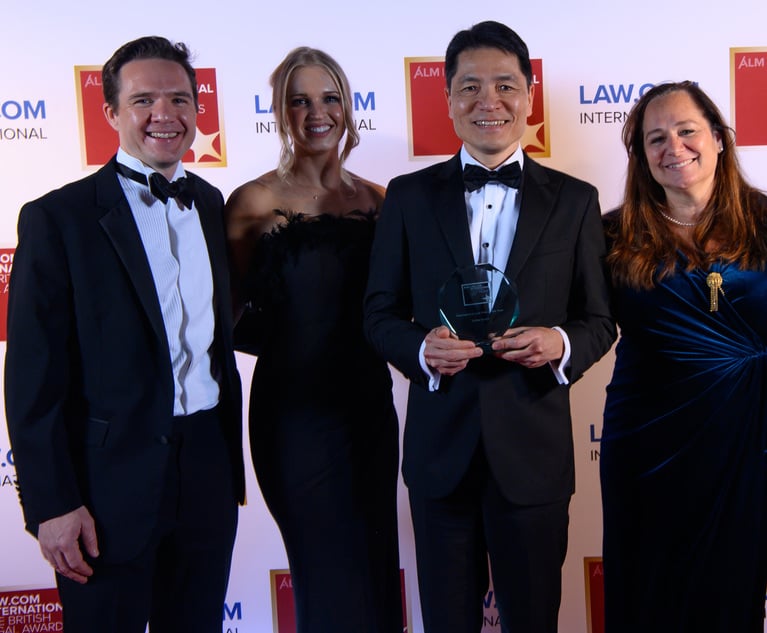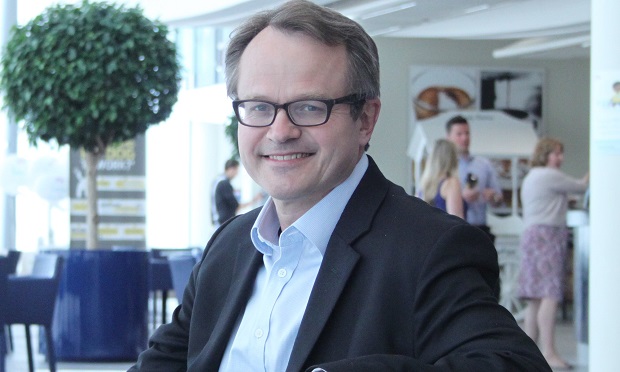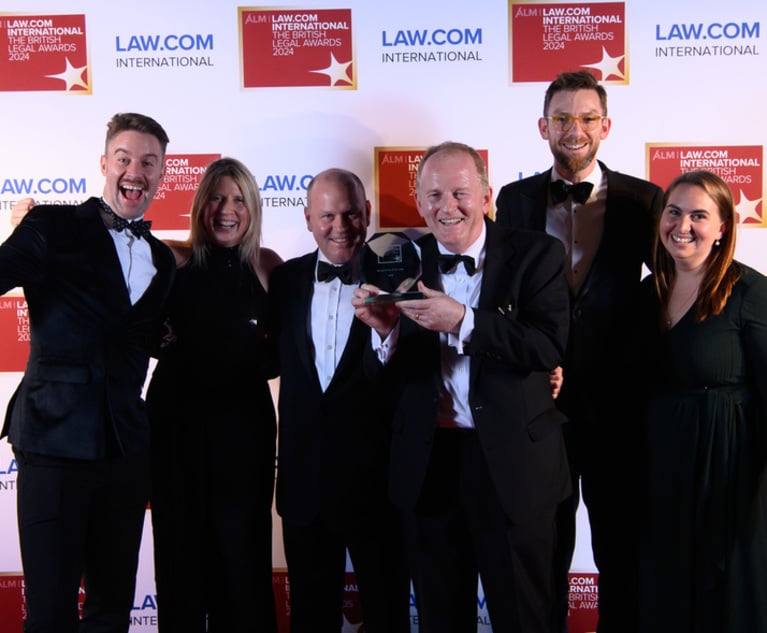'We need to recognise we all have biases' – Nestle's Mark Maurice-Jones on tackling the diversity dilemma
Nestle UK & Ireland GC Mark Maurice-Jones will be among the speakers at LegalWeek CONNECT next month
October 30, 2018 at 06:32 AM
5 minute read
At LegalWeek CONNECT next month, Nestlé UK and Ireland GC Mark Maurice-Jones will be part of a panel of senior in-house lawyers discussing gender diversity and the legal profession's efforts to improve representation. Ahead of the event, he discusses stereotypes, #MeToo and the pay gap.
At LegalWeek CONNECT you're part of a panel discussion on legal departments and how they can drive better diversity within legal teams – what are you expecting to touch on?
When we talk about diversity and inclusion, the most important thing is inclusion – you've got to bring everybody together. So if you start talking about men versus women, you get into dangerous territory. For example, if you have women-only meetings, people can feel quite excluded. It's about being fair to everyone and including everyone.
Do you think male lawyers are being stereotyped?
I think role models are really important. If the partners in firms are middle-aged white men, that in itself creates a culture; whereas we need to encourage a culture of inclusivity.
Firstly, it's about shining the light on this issue, as not everyone thinks there's an issue. We need to recognise we all have biases and sometimes we behave in certain ways because of these underlying biases.
People in senior positions have to create the culture because they are where those barriers and stereotypes can be broken down. But of course this can be encouraged by everyone – not just those in senior positions.
➤➤ Diversity and inclusion, in particular gender equality, is the focus of day two of LegalWeek CONNECT, taking place on 28-29 November at County Hall, London SE1. Click here for more information
As we approach the end of 2018, do you think there is still a fair amount of gender imbalance and discrimination in legal teams?
My experiences at Nestlé are that at a certain level – at a lawyer advisory level – we have a good representation of female lawyers. But when we get to the senior levels, that's when you start to see the number of women dropping.
Within private practice, or among partners or management roles, you still today start to see a reduction in the number of women.
What's your view on the pay gap scandal and firms not having to report on partner pay?
I understand from hearing others speak about this that some law firms have been a bit slow in terms of reporting their pay gaps, using technical arguments as to why the rules don't apply to law firms in the same way as they do other businesses.
I do think that with the gender pay reporting, we found it helpful in that it just confirms some of the things that we knew already – that we don't have as many women working at the senior end. And it's really important to shed light on this issue.
How have things changed in light of #MeToo? Are you noticing a change, or at least more discussion of the topic?
Here at Nestlé, we have diversity and inclusion as one of our key business drives – it's part of our strategy plan. So we have to initiate this within our plans for the business.
It's important to be able to measure how these are working as well, introducing a way to measure how effectively the techniques are working to encourage diversity.
What is Nestlé doing to address the issue of diversity?
Firstly, we are trying to raise lots of awareness. This I think is very important because I don't think there actually is awareness across the whole board and within all communities.
We've also launched training for people to understand what is meant by unconscious bias. It's a thing that everyone has, but we're training people so they can understand their own unconscious biases better. Before we make any decisions, we tend to go over and repeat the principles around unconscious bias we have learned.
We are also looking to get more women in our progression plans towards the more senior end of the business, and getting better at calling out any bias in all areas – shining a light and encouraging greater transparency.
How can companies use their powers, be it financial or reputational, to increase legal diversity?
That's something we have thought about – whether we should be required to ask our suppliers to adhere to certain standards of diversity. We haven't taken it to that point yet, but it's certainly something that could work.
How will Nestlé look to continue this drive for diversity in the future?
Apart from the things I've just discussed, we've built up diversity advocates across the company to drive cultural change.
We will continue to do what we've been doing and will continue to raise discussions, continue to look at people's succession plans, and if women aren't included in our teams' succession plans, then why not? Basically, we're going to keep banging on about it.
What about LegalWeek CONNECT are you most looking forward to?
It's important for me to go to because this topic is a learning experience. My motivation for working in this area at Nestlé is that I've got five daughters, and I want their future to be one where they are treated fairly. I'm constantly being educated on how things might be perceived, and how we can improve. It's all about learning from others and sharing ideas.
NOT FOR REPRINT
© 2025 ALM Global, LLC, All Rights Reserved. Request academic re-use from www.copyright.com. All other uses, submit a request to [email protected]. For more information visit Asset & Logo Licensing.
You Might Like
View All
International Law Firm of the Year: A Q&A with Sidley Austin's London Managing Partner
5 minute read
Inside Travers Smith's AI Training, Development Efforts

From Olympic Aspirations to Legal Innovation: Tom Dunlop's Journey to Founding Summize
8 minute readTrending Stories
- 1Exploring the Opportunities and Risks for Generative AI and Corporate Databases: An Introduction
- 2Farella Elevates First Female Firmwide Managing Partners
- 3Family Court 2024 Roundup: Part I
- 4In-House Lawyers Are Focused on Employment and Cybersecurity Disputes, But Looking Out for Conflict Over AI
- 5A Simple 'Trial Lawyer' Goes to the Supreme Court
Who Got The Work
J. Brugh Lower of Gibbons has entered an appearance for industrial equipment supplier Devco Corporation in a pending trademark infringement lawsuit. The suit, accusing the defendant of selling knock-off Graco products, was filed Dec. 18 in New Jersey District Court by Rivkin Radler on behalf of Graco Inc. and Graco Minnesota. The case, assigned to U.S. District Judge Zahid N. Quraishi, is 3:24-cv-11294, Graco Inc. et al v. Devco Corporation.
Who Got The Work
Rebecca Maller-Stein and Kent A. Yalowitz of Arnold & Porter Kaye Scholer have entered their appearances for Hanaco Venture Capital and its executives, Lior Prosor and David Frankel, in a pending securities lawsuit. The action, filed on Dec. 24 in New York Southern District Court by Zell, Aron & Co. on behalf of Goldeneye Advisors, accuses the defendants of negligently and fraudulently managing the plaintiff's $1 million investment. The case, assigned to U.S. District Judge Vernon S. Broderick, is 1:24-cv-09918, Goldeneye Advisors, LLC v. Hanaco Venture Capital, Ltd. et al.
Who Got The Work
Attorneys from A&O Shearman has stepped in as defense counsel for Toronto-Dominion Bank and other defendants in a pending securities class action. The suit, filed Dec. 11 in New York Southern District Court by Bleichmar Fonti & Auld, accuses the defendants of concealing the bank's 'pervasive' deficiencies in regards to its compliance with the Bank Secrecy Act and the quality of its anti-money laundering controls. The case, assigned to U.S. District Judge Arun Subramanian, is 1:24-cv-09445, Gonzalez v. The Toronto-Dominion Bank et al.
Who Got The Work
Crown Castle International, a Pennsylvania company providing shared communications infrastructure, has turned to Luke D. Wolf of Gordon Rees Scully Mansukhani to fend off a pending breach-of-contract lawsuit. The court action, filed Nov. 25 in Michigan Eastern District Court by Hooper Hathaway PC on behalf of The Town Residences LLC, accuses Crown Castle of failing to transfer approximately $30,000 in utility payments from T-Mobile in breach of a roof-top lease and assignment agreement. The case, assigned to U.S. District Judge Susan K. Declercq, is 2:24-cv-13131, The Town Residences LLC v. T-Mobile US, Inc. et al.
Who Got The Work
Wilfred P. Coronato and Daniel M. Schwartz of McCarter & English have stepped in as defense counsel to Electrolux Home Products Inc. in a pending product liability lawsuit. The court action, filed Nov. 26 in New York Eastern District Court by Poulos Lopiccolo PC and Nagel Rice LLP on behalf of David Stern, alleges that the defendant's refrigerators’ drawers and shelving repeatedly break and fall apart within months after purchase. The case, assigned to U.S. District Judge Joan M. Azrack, is 2:24-cv-08204, Stern v. Electrolux Home Products, Inc.
Featured Firms
Law Offices of Gary Martin Hays & Associates, P.C.
(470) 294-1674
Law Offices of Mark E. Salomone
(857) 444-6468
Smith & Hassler
(713) 739-1250










